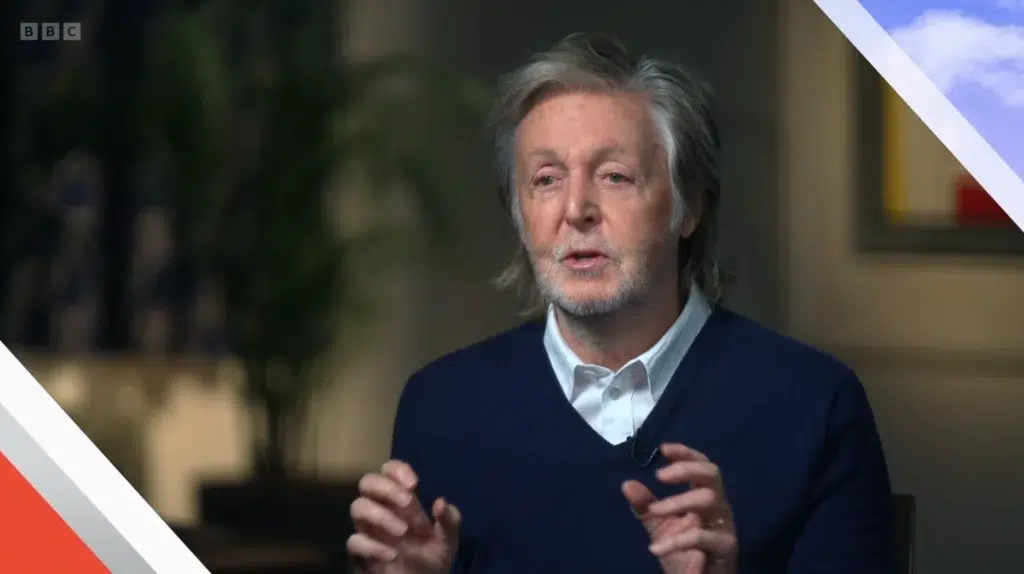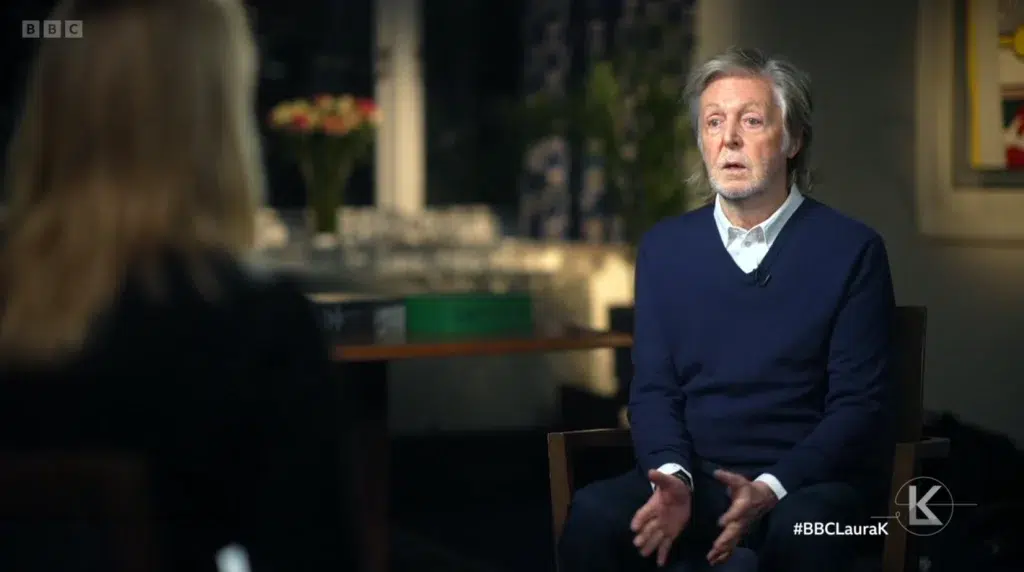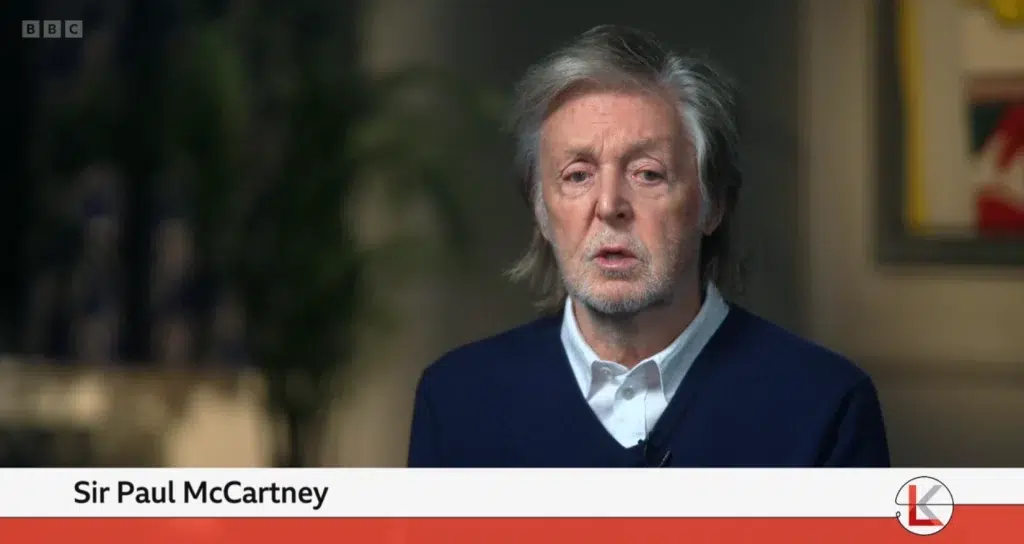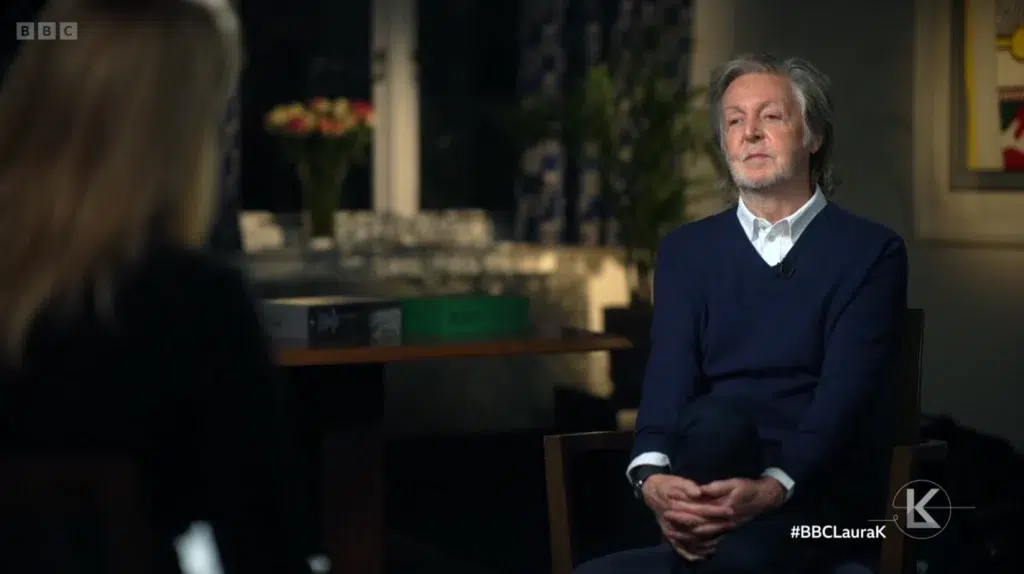Sunday, January 26, 2025
Interview for Sunday with Laura Kuenssberg
Interview with BBC1
Interview of Paul McCartney
Sunday, January 26, 2025
Interview of Paul McCartney
Interview 2025 • Paul McCartney interview for paulmccartney.com
Interview Jan 22, 2025 • Paul McCartney interview for MOJO
Interview Jan 26, 2025 • Paul McCartney interview for BBC 1
Article Feb 02, 2025 • "Now And Then" wins the Grammy Awards for Best Rock Performance
Article Feb 09, 2025 • Paul McCartney attends Super Bowl LIX
Next interview Feb 13, 2025 • Santiago Pozzi interview for Calico Skies Radio
Unreleased song
Interview with BBC 1's The One Show programme
Jun 12, 2023 • From BBC 1
The interview below has been reproduced from this page. This interview remains the property of the respective copyright owner, and no implication of ownership by us is intended or should be inferred. Any copyright owner who wants something removed should contact us and we will do so immediately.
In December 2024, the UK government initiated a consultation aimed at overhauling UK copyright law, enabling AI developers to use creators’ online content for model development unless the rights holders choose to opt out.
From Copyright and Artificial Intelligence – GOV.UK:
Both our creative industries and our AI sector are UK strengths. They are vital to our national mission to grow the economy. This consultation sets out our plan to deliver a copyright and AI framework that rewards human creativity, incentivises innovation and provides the legal certainty required for long-term growth in both sectors.
At present, the application of UK copyright law to the training of AI models is disputed. Rights holders are finding it difficult to control the use of their works in training AI models and seek to be remunerated for its use. AI developers are similarly finding it difficult to navigate copyright law in the UK, and this legal uncertainty is undermining investment in and adoption of AI technology.
This status quo cannot continue. It risks limiting investment, innovation, and growth in the AI sector, and in the wider economy. It effectively prevents creative industries from exercising their rights.
There is great strength and breadth of feeling about the best way forward. This government recognises that it must tackle the difficult choices now to unlock growth, innovation and protect human creativity. This consultation seeks views on how we can deliver a solution that achieves our key objectives for the AI sector and creative industries.
In December 2024, Paul McCartney issued a statement regarding the risks AI poses to music creators. On January 26, 2025, he was interviewed by BBC1 to discuss his concerns in more details.
Paul, as computers become more and more sophisticated and suck in more and more content that humans have created, the government has some big decision to take whether they protect the copyrights of musicians, actors, artists… What do you worry about?
Paul McCartney: Just that. Just worrying about the copyrights not being protected. Cause it’s a bit like Wild West. The people who have created these copyrights don’t benefit. And I think it takes away a lot of incentive, you know, because when we were kids in Liverpool, we found a job that we loved but it also paid the bills. So, it allowed us to be creative, more and more creative, go out in the world, and bring joy to people, so it allowed us to do that.
I think, if you take that away, and they take the incentive away, not protecting the copyrights, I think it would be a shame, and I think you would see a loss of creativity, which is a great pity. It’s what brings so much joy to the world.
The Beatles were about music, but also about put food on the table and pay the bills as a young man. What do you think the risk is for the next generation of musicians coming through?
So for instance, you get young guys, girls, coming up, and they write a beautiful song, and they don’t own it, and they don’t have anything to do with it. And anyone who wants can just rip it off. I mean, the truth is, the money’s going somewhere. You know, it gets on the streaming platforms. Somebody’s getting it. And it should be the person who created it. It shouldn’t just be some tech giant somewhere. Somebody’s getting paid, so why shouldn’t it be the guy who sat down and wrote Yesterday? It should be something to do with him.
And if you hadn’t been paid, maybe the world would never have heard “Yesterday” or “Let It Be” or “Hey Jude.”
You know, that’s really true, because you liked to think our art as the muse. The muse comes to me. It’s not like that. We started off and we had options to go and work in a factory, or get another job. Occasionally, you did those kinds of job. But the minute you found a job you loved, which for us was music, it really made a great big difference. It allowed us to do stuff that our working class, friends, had never been able to do. So I think it’s a great thing.
And actually, you used a kind of machine learning technology to help produce the song you put out last year, to recreate John Lennon’s vocal performance from something from 1970, so what would you say to someone who’s saying [inaudible] you don’t like the idea of progress.
Yeah, I get that, and I think AI is great and can do a lot of great things. As you say, we took an old cassette of John and clean his voice up, so it sounds it has just been recorded yesterday… My worry in this rip-off area… You know that was John’s singing, he was in The Beatles, his widow gave us the tape, so there was no question of copyright. But if you take that and you would rip it off… So for instance, you see, I’m on the internet singing “God Only Knows” by The Beach Boys, but I’ve never sung it. But AI made me sing it. So somebody is getting some kind of pay-off there. And it’s not me, I’m not interested. But I was told it doesn’t sound like me, not quite. To casual observers, it’s me singing “God Only Knows,” but I said to this person, you know, give it five years, and it will sound exactly like me, and the guy said “one”. Give it one year. And it’s true, it’s going so fast that, you know, there are going to be able to put my voice on anything. So I think you just have to worry about the rip-off. AI is a great thing, but it shouldn’t rip creative people off. There’s no sense in that. Why would the government want to do that? I don’t get.
So what would your message then be? As it happens, we have the Chancellor with us on this Sunday morning. What would your message be to the politicians who make the decisions at the moment, about how or whether to protect the copyrights of artists like you?
We’re the people, you’re the government! You’re supposed to protect us. That’s your job. So you know, if you’re putting through a bill, make sure you protect the creative thinkers, the creative artists, or you’re not going to have them.
As simple as that.
There’s such a thing as a government. It’s their responsibility, I would think, to protect the young people, to try and enhance the whole thing, so that it works. So that, these people have got jobs and can enhance the world with their wonderful art. It’s all protected!
You’ve certainly enhanced the world in many ways for hundred of millions of people. It’s been an absolute joy to talk to you, Sir, on this weekend program.
Thanks Laura. Thank you, I’m a fan of yours, too!





Notice any inaccuracies on this page? Have additional insights or ideas for new content? Or just want to share your thoughts? We value your feedback! Please use the form below to get in touch with us.